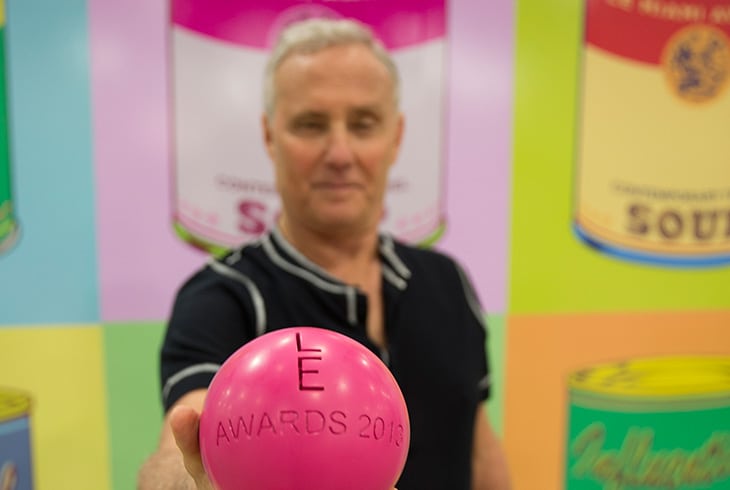Skift Take
Due to the ubiquity of "design hotels," the next generation of hip lifestyle hotels are attracting today's most trend-conscious consumers with improved comfort, service and cultural experiences, as well as head-turning design.
- LE Miami’s Leadership Lab
- LE Miami trade show floor
- LE Miami trade show floor
- Serge Dive (yellow pants)
- DJ Jared Dietch
- Ian Schrager
- Seth Godin
- Carlos Couturier
- W South Beach
- The James Royal Palm South Beach
LE Miami is a new hotel industry trade show redefining contemporary travel for the “creative class,” consisting of well traveled, highly educated professionals working in creative industries. It launched last summer in Miami, bringing together hotel suppliers, online distribution channels and travel wholesalers to network and sign new business. Demand is clearly there. The guest list for LE Miami 2014 has already surpassed the total attendance of this year’s event.
“LE Miami is a marketplace where all of the brands that are the most rebellious, the most forward thinking, the most creative are in one single place,” says Serge Dive, CEO of London-based Beyond Luxury Media, parent of LE Miami.
During the inaugural show, 11 attending hotel CEOs, VPs and creative directors got together at the new SLS Hotel South Beach to hammer out the framework for the LE Miami Leadership Lab, which just launched last month online. The manifesto is an explanation of today’s emerging hotel trends created by the people establishing those trends.
In the introduction, the opening sentence states: “Contemporary travel was born on a New York dance floor.” That acknowledges Studio 54 founder Ian Schrager as the catalyst behind the boutique hotel boom in the 1980s when he launched Morgans Hotels. However, fast forward three decades to today, the “design hotel” concept has reached a saturation point with so many hotels promoting themselves as such. It is no longer a relevant differentiator for trendspotting travelers.
Hence, the central question is posed, which is basically the raison d’être for LE Miami: “How can the contemporary travel industry continue to evolve to remain in tune with its trendsetting and eclectic audience?”
The Leadership Lab is organized into the following three sections to answer that question.
Big Bang: The Origins of Contemporary Travel
The redefinition of traveling well—specifically for more upscale, cultured clientele—begins with the redefinition of luxury. At the beginning of the boutique hotel revolution, luxury was defined by the expense of things, and the prestige imbued on people who could afford those things.
Over time, edgy design and more experiential travel have come to trump opulence, exclusivity and status as de facto requirements for members of the creative class.
That shift represents the primary transition of luxury travel into the post-Boomer generation. The Leadership Lab refers to them as a “pioneering crowd” whose tastes evolved as “luxury hotels and travel brands became more expansive, collaborative and even inclusive, whilst retaining their high-end edge.”
This section brings up one of the critiques leveled against the early boutique hotel sector. Thirty years ago, deft service wasn’t exactly something these hotels trumpeted, when staff was often hired more for their looks and attitude over knowledge and experience. The Leadership Lab juggles with that a bit, almost defending it, stating those early hotels targeted a select crowd. The lesson here is more about the value of understanding your audience.
The Lab creators write: “Whilst some may argue that service was often sacrificed on the altar of ‘cool,’ the concept of defining and catering to an individualistic, creative consumer continues to inform contemporary culture.”
Now Generation: The Current Shape of the Industry
User experience now defines the world’s most trendy hotels, supplanting the pure visual, surface-only appeal of the early boutique/design hotels. That’s not to say design isn’t still a defining priority. The participating hotel groups in LE Miami continue setting the bar for some of the world’s most innovative hotel architecture and interior design. That ranges from the louche low-fi vibe at Ace Hotel to the more classically redolent One&Only group.
The difference now is an equal focus on service, comfort and the overall hotel experience.
“It’s about wellness, quietness and meditation rather than flash,” said Carlos Couturier, managing director of Grupo Habita, which operates Hôtel Americano in Manhattan and some of Mexico’s most creative hotels.
The hotel experience, meanwhile, is evolving into a destination experience by integrating the local neighborhood through partnerships with creative small businesses in the area. That can mean anything from collaborations with local celeb chefs to pop-up art installations.
“Experience hotels are the new design hotels,” summed up Brad Wilson, president of Ace Hotel.
Evolution: Edited Experiences
Looking ahead, the founding fathers of the Leadership Lab have defined the future of contemporary travel in terms of “content.” In other words, there is only so far hoteliers can go with the physical hardware of a hotel—its design, shape and infrastructure—no matter how innovative it is. The future is what they refer to as “hotel software”—the ability to manipulate and update the hotel experience on a consistent basis daily, even hourly.
This is where things get interesting. It’s why companies like ME Hotels came out with the industry’s first “vibe managers.” It’s all about curating the experience and personalizing it to the individual hotel guest. One way to do that is through programming special events, from concerts to pop-up shops, and communicating those events via sophisticated hotel website platforms and social media.
The potential here is infinite. Hotels are becoming showcases for great art, film, fashion, music and food festivals, etc., as well as launchpads for the artists and artisans who make these moments happen.
“The world’s most contemporary hotels today are acting like lifestyle brands more than travel brands, for both the leisure and business markets,” says Cj Holden, event manager and marketing director for LE Miami.
Creativity is a Business Driver
Bestselling author and celeb marketing guru Seth Godin gave a keynote speech at LE Miami 2013. He made the case that “we are being marketed to death.” As everyone tries to differentiate themselves in the marketplace, it’s those companies speaking to their audience on a creative, humanistic level who are resonating most, versus the sales-y marketingspeak of old based on price point.
“If you’re trying to reach the masses, you’re going to be up against the people that are offering something cheaper than you,” said Godin. “The problem with a race to the bottom is you might win…. If you’re the same as everybody else in a world where I can sort by price, you’re doomed.”
Godin made the analogy with the hospitality industry succinctly. Hotels with the most creative content—the most visceral and memorable experiences—are the hotels attracting more marketshare today.
Skift spoke with some of the travel buyers about their impressions of LE Miami.
“Sometimes at these events I get the feeling that the real players are back at the hotel, and they’re sending other people onto the floor to meet us,” says Chris Kirkwood, VIP agent for BCD Travel, the world’s second largest corporate travel agency. “But because this is a very customized show, you get the higher end people. And at the same time, there was a lot of hunger and desire from them to make business happen.”
Nicky Cheeseman is a London-based entertainment travel specialist for ALTOUR, who visited Miami for the first time because of this event.
“I definitely achieved my goals in the most fabulous of settings,” she says, enamored with the lineup of special events in some of America’s most glamorous hotel venues. “And even though it was work, it certainly didn’t feel that way.”
That dissolution of the line between work and play is the greatest achievement for anyone in today’s creative class.
For more insight into the future of contemporary travel, visit LE Miami’s Ministry of Ideas webpage for a selection of videos and podcasts from the speaker sessions. Check out the Leadership Lab at leadership-lab.net.
Greg Oates covers hospitality trends and next generation hotels. He has participated in 1,000+ hotel site inspections in over 50 countries.
Have a confidential tip for Skift? Get in touch
Tags: ace hotel, bcd travel, morgans, one&only, sls hotels
Photo credit: Hotel pioneer Ian Schrager at LE Miami. LE Miami










